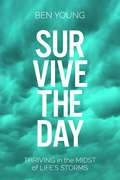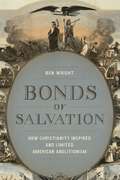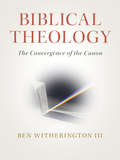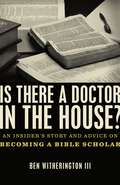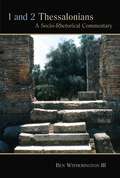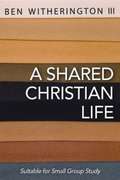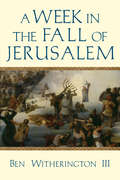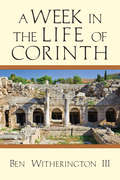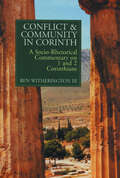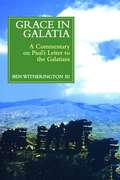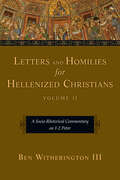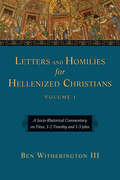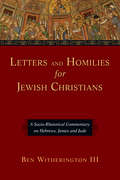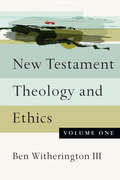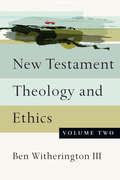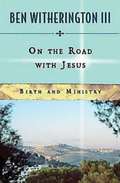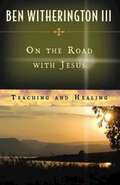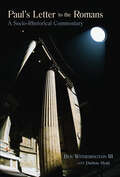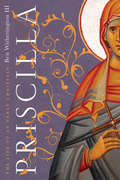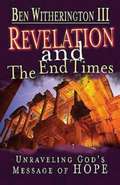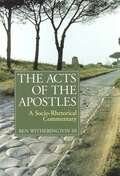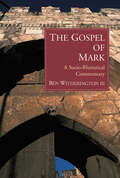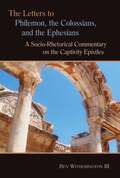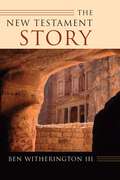- Table View
- List View
Survive the Day: Thriving in the Midst of LIfe's Storms
by Ben YoungStorms in life are inevitable. Eventually everyone faces one. Sometimes difficult circumstances continue with no end in sight while prayers for miracles seem to go unanswered. For the past three decades, pastor Ben Young has worked with families and individuals struggling to cope with the harsh realities of major life crisis. He also knows personally what it&’s like to endure an ongoing storm. Through his own trials, he has learned not only to survive each dark day, but to live every day in ways that make a person stronger, wiser, and more at peace.
Bonds of Salvation: How Christianity Inspired and Limited American Abolitionism
by Ben WrightBen Wright’s Bonds of Salvation demonstrates how religion structured the possibilities and limitations of American abolitionism during the early years of the republic. From the American Revolution through the eruption of schisms in the three largest Protestant denominations in the 1840s, this comprehensive work lays bare the social and religious divides that culminated in secession and civil war. Historians often emphasize status anxieties, market changes, biracial cooperation, and political maneuvering as primary forces in the evolution of slavery in the United States. Wright instead foregrounds the pivotal role religion played in shaping the ideological contours of the early abolitionist movement. Wright first examines the ideological distinctions between religious conversion and purification in the aftermath of the Revolution, when a small number of white Christians contended that the nation must purify itself from slavery before it could fulfill its religious destiny. Most white Christians disagreed, focusing on visions of spiritual salvation over the practical goal of emancipation. To expand salvation to all, they created new denominations equipped to carry the gospel across the American continent and eventually all over the globe. These denominations established numerous reform organizations, collectively known as the “benevolent empire,” to reckon with the problem of slavery. One affiliated group, the American Colonization Society (ACS), worked to end slavery and secure white supremacy by promising salvation for Africa and redemption for the United States. Yet the ACS and its efforts drew strong objections. Proslavery prophets transformed expectations of expanded salvation into a formidable antiabolitionist weapon, framing the ACS's proponents as enemies of national unity. Abolitionist assertions that enslavers could not serve as agents of salvation sapped the most potent force in American nationalism—Christianity—and led to schisms within the Presbyterian, Baptist, and Methodist churches. These divides exacerbated sectional hostilities and sent the nation farther down the path to secession and war. Wright’s provocative analysis reveals that visions of salvation both created and almost destroyed the American nation.
Biblical Theology: The Convergence of the Canon
by Ben Witherington, IIIIn Biblical Theology, Ben Witherington, III, examines the theology of the Old and New Testaments as a totality. Going beyond an account of carefully crafted Old and New Testament theologies, he demonstrates the ideas that make the Bible a sacred book with a unified theology. Witherington brings a distinctive methodology to this study. Taking a constructive approach, he first examines the foundations of the writers' symbolic universe - what they thought and presupposed about God - and how they revealed those thoughts through the narratives of the Old and New Testaments. He also shows how the historical contexts and intellectual worlds of the Old and New Testaments conditioned their narratives, and, in the process, created a large coherent Biblical world view, one that progressively reveals the character and action of God. Thus, the Yahweh of the Old Testament, the Son in the Gospels, and the Father, Son, and Spirit in the New Testament writings are viewed as persons who are part of the singular divine identity. Sensitive to do a more than merely thematic reading of the Bible which strips texts out of their original context, Witherington's progressive revelation approach allows each part of the canon to be read in its original context and with its original meaning. The result is a Biblical theology that allows Jews and Christian's to dialogue about and appreciate the sacred scriptures in both testaments. The capstone work of an internationally known theologian, Biblical Theology also offers new insights on key theological issues, including the character of God, grace, covenants, salvation, election, and eschatology as they relate to the doctrine of God.
Is there a Doctor in the House?: An Insider’s Story and Advice on becoming a Bible Scholar
by Ben Witherington IiiMany people assume that becoming a serious student of the Bible merely requires diligent study of English Bible translations, but biblical scholarship is much more complex. Is There a Doctor in the House? demonstrates what it takes to be a responsible Bible teacher, a well-published Bible scholar, or even a good student of the Bible: exacting knowledge of biblical languages and the languages in which most Bible scholarship is done; a love for history and archaeology; a sensitivity for literature and literary genres; and an understanding of theology, ethics, and ancient religions and philosophies. In one sense, every Bible scholar has to be a general practitioner—the foundation of biblical scholarship must be both broad and well built. Through the course of this book, Witherington invites would-be Bible experts to pursue excellence for the sake of the Bible’s world-altering message. From students considering a Ph.D. to lay Bible teachers, Is There a Doctor in the House? promises to be an informative, engaging, and often humorous resource.
1 and 2 Thessalonians: A Socio-Rhetorical Commentary
by Ben Witherington IIIPaul's two letters to the Thessalonians stand as some of the very earliest Christian documents, yet they appear well into Paul's missionary career, giving them a unique context well worth exploring. In this first full-scale socio-rhetorical commentary on 1 and 2 Thessalonians, Ben Witherington gleans fresh insight from reading Paul's text in the light of rhetorical concerns and patterns, early Jewish theology, and the first-century historical situation in Macedonia.Witherington's distinctive socio-rhetorical approach helps unearth insights that would otherwise remain hidden using only form criticism, epistolary categories, and traditional criticism. Witherington details Thessalonica's place as the "metropolis" of Macedonia, and he carefully unpacks the social situation of Paul and his recipients. Scholars will appreciate the careful analysis and rhetorical insights contained here, while Witherington's clear prose and sensitivity to Paul's ideas make this work ideal for all who desire a useful, readable commentary on 1 and 2 Thessalonians.
A Shared Christian Life
by Ben Witherington IIIThis book is for is for everyday Christians who seek to love God and offer charity toward others by celebrating spiritual practices in their congregation. It is meant to encourage you to be an integral part of the body of Christ --working and serving together, loving God with hearts but also with hands and feet—to be formed as a disciple of Jesus Christ. In the Wesleyan tradition, we believe that Christian formation happens best “when two or more are gathered.” So focus is the body of Christ gathered--worshiping; sharing, learning, fellowshipping, taking Holy Communion, and doing works of piety and charity--together. In addition, a relationship with God is not primarily an individual’s lonely personal quest for transcendence. It is not about becoming more self-centered, more self-focused, but it is about becoming more self-forgetful. The book outlines spiritual practices that involve individual and congregational transformation through learning and loving, fellowship and worship, by being lifted up in spirit and being enlightened in mind. A normal Christian life needs balance not only between work and rest and play, but also between worship, sacraments, doing, and learning. It needs balance between being alone with God and time with significant others.
A Week in the Fall of Jerusalem (A Week in the Life Series)
by Ben Witherington IIIA Week in the Fall of Jerusalem
A Week in the Life of Corinth (A Week in the Life Series)
by Ben Witherington IIIBen Witherington III attempts to reenchant our reading of Paul in this creative reconstruction of ancient Corinth. Following a fictitious Corinthian man named Nicanor through an eventful week of business dealings and conflict, you will encounter life at various levels of Roman society--eventually meeting Paul himself and gaining entrance into the Christian community there. The result is an unforgettable introduction to life in a major center of the New Testament world. Numerous full-page text boxes expand on a variety of aspects of life and culture as we encounter them in the narrative.
Conflict and Community in Corinth: A Socio-Rhetorical Commentary on 1 and 2 Corinthians
by Ben Witherington IIIThis unprecedented commentary applies an exegetical method informed by both sociological insight and rhetorical analysis to the study of 1 and 2 Corinthians. In addition to using traditional exegetical and historical methods, this unique study also analyzes the two letters of Paul in terms of Greco-Roman rhetoric and ancient social conditions and customs to shed fresh light on the context and content of Paul's message. Includes 21 black-and-white photos and illustrations.
Grace in Galatia: A Commentary on Paul's Letter to the Galatians
by Ben Witherington IIIGrace in Galatia is an innovative socio-rhetorical study of Paul's most polemical letter. Ben Witherington breaks new ground by analyzing the whole of Galatians as a deliberative discourse meant to forestall the Galatians from submitting to circumcision and the Jewish law. The commentary features the latest discussion of major problems in Pauline studies, including Paul's view of the law and the relationship between the historical data in Galatians and in Acts. Yet the narrative character of Witherington's work allows it to remain exceedingly accessible. The volume also includes sections following the major divisions of the commentary that point to the relevance of the text for believers today, making Grace in Galatia of special value to pastors and general readers as well as students and scholars.
Letters and Homilies for Hellenized Christians: A Socio-Rhetorical Commentary on 1-2 Peter (Letters and Homilies Series #Volume 2)
by Ben Witherington IIILetters and Homilies for Hellenized Christians, Volume 2
Letters and Homilies for Hellenized Christians: A Socio-Rhetorical Commentary on Titus, 1-2 Timothy and 1-3 John (Letters and Homilies Series #Volume 1)
by Ben Witherington IIILetters and Homilies for Hellenized Christians
Letters and Homilies for Jewish Christians: A Socio-Rhetorical Commentary on Hebrews, James and Jude (Letters And Homilies Ser.)
by Ben Witherington IIIIn this commentary on Hebrews, James and Jude, Ben Witherington III applies his socio-rhetorical method to elucidate these letters within their primarily Jewish context, probing the social setting of the readers and the rhetorical strategies of the authors of the letters.
New Testament Theology and Ethics (New Testament Theology And Ethics Ser. #Volume 1)
by Ben Witherington IIIAll too often, argues Ben Witherington, the theology of the New Testament has been divorced from its ethics, leaving as isolated abstractions what are fully integrated, dynamic elements within the New Testament itself. As Witherington stresses, "behavior affects and reinforces or undoes belief." Having completed commentaries on all of the New Testament books, a remarkable feat in itself, Witherington now offers the first of a two-volume set on the theological and ethical thought world of the New Testament. The first volume looks at the individual witnesses, while the second examines the collective witness. The New Testament, says Ben Witherington, is "like a smallish choir. All are singing the same cantata, but each has an individual voice and is singing its own parts and notes. If we fail to pay attention to all the voices in the choir, we do not get the entire effect. . . . If this first volume is about closely analyzing the sheet music left to us by which each musician's part is delineated, the second volume will attempt to re-create what it might have sounded like had they ever gotten together and performed their scores to produce a single masterful cantata." What the New Testament authors have in mind, Witherington contends, is that all believers should be conformed in thought, word and deed to the image of Jesus Christ--the indelible image.
New Testament Theology and Ethics (New Testament Theology and Ethics #Volume 2)
by Ben Witherington IIIAll too often, argues Ben Witherington, the theology of the New Testament has been divorced from its ethics, leaving as isolated abstractions what are fully integrated, dynamic elements within the New Testament itself. As Witherington stresses, "behavior affects and reinforces or undoes belief." Having completed commentaries on all of the New Testament books, a remarkable feat in itself, Witherington now offers the second of a two-volume set on the theological and ethical thought world of the New Testament. The first volume looks at the individual witnesses, while the second examines the collective witness. The New Testament, says Ben Witherington, is "like a smallish choir. All are singing the same cantata, but each has an individual voice and is singing its own parts and notes. If we fail to pay attention to all the voices in the choir, we do not get the entire effect. . . . [If the first volume was] about closely analyzing the sheet music left to us by which each musician's part is delineated, [this second volume attempts] to re-create what it might have sounded like had they ever gotten together and performed their scores to produce a single masterful cantata." What the New Testament authors have in mind, Witherington contends, is that all believers should be conformed in thought, word and deed to the image of Jesus Christ--the indelible image.
On the Road with Jesus: Birth and Ministry
by Ben Witherington IIITravel to the Holy Land with New Testament scholar Ben Witherington and experience the birth and ministry of Jesus in this study guide that goes along with a four-session video study available seperately.Filmed throughout the places Jesus walked and dwelt among us, On the Road with Jesus, with Dr. Witherington's knowledge and perspective, will help you see God's grace at work and bring us back to lives of true meaning and purpose. As believers see places such as Bethlehem, Nazareth, the Sea of Galilee, the Jordan River, and more, our faith will be deepened while following along the paths Jesus journeyed during his world-changing life and ministry.
On the Road with Jesus: Teaching and Healing
by Ben Witherington IIIJesus changed lives; let him change yours.In this 4-session video study with popular author and New Testament scholar, Ben Witherington takes you to the sites where Jesus ministered. Through Jesus, we see God’s grace empowering us to live more fully and faithfully. Relax as Dr. Witherington takes you to the places where the Son of God taught and performed miracles. Visit such places as Jerusalem, Capernaum, Bethsaida, Caesarea Philippi. Gain new understandings of the world in which Jesus taught as you deepen your faith and walk beside Jesus down the streets and paths of the Holy Land. See how God’s passion for us will open your eyes to new possibilities for your own discipleship.
Paul's Letter to the Philippians: A Socio-Rhetorical Commentary
by Ben Witherington IIIInterprets Paul’s letter in light of its rhetorical content and cultural contextSkeptical of the trend among many biblical scholars to analyze Paul’s short, affectionate letter to the Philippians in light of Greco-Roman letter-writing conventions, Ben Witherington instead looks at Philippians as a masterful piece of long-distance oratory — an extension of Paul’s oral speech, dictated to a scribe and meant to be read aloud to its recipients. Witherington examines Philippians in light of Greco-Roman rhetorical conventions, identifying Paul’s purpose, highlighting his main points and his persuasive strategies, and considering how his original audience would have heard and received Paul’s message.
Paul's Letter to the Romans: A Socio-Rhetorical Commentary
by Ben Witherington IIIWhile Paul’s letter to the Romans is the most studied and commented-on document from the biblical period, the major exegetical books on Romans from the nineteenth and twentieth centuries have been overwhelmingly shaped by the Reformed tradition. Through a careful survey of work on Romans by both ancient Church Fathers and modern exegetical scholars, Ben Witherington III here argues that the interpretation of Romans since the Reformation has been far too indebted to — and at key points led astray by — Augustinian readings of the text as filtered through Luther, Calvin, and others. In this first full-scale socio-rhetorical commentary on Romans, Witherington gleans fresh insights from reading the text of Paul’s epistle in light of early Jewish theology, the historical situation of Rome in the middle of the first century A.D., and Paul’s own rhetorical concerns. Giving serious consideration to the social and rhetorical background of Romans allows readers to hear Paul on his own terms, not just through the various voices of his later interpreters. Witherington’s groundbreaking work also features a new, clear translation of the Greek text, and each section of the commentary ends with a brief discussion titled “Bridging the Horizons,” which suggests how the ancient text of Romans may speak to us today.
Priscilla: The Life of an Early Christian
by Ben Witherington IIIWho was Priscilla? Readers of the Bible may know her as the wife of Aquila, Paul's coworker, or someone who explained baptism to Apollos. Biblical references to Priscilla spark questions: Why is she mentioned before her husband? Does the mention of her instruction of Apollos mean that women taught in the church? What is her story? Ben Witherington addresses these questions and more. In this work of historical fiction, Priscilla looks back on her long life and remembers the ways she has participated in the early church. Her journey has taken her to Ephesus, Corinth, and Rome, and she's partnered with Paul and others along the way. Priscilla's story makes the first-century world come alive and helps readers connect the events and correspondence in different New Testament books. Witherington combines biblical scholarship and winsome storytelling to give readers a vivid picture of an important New Testament woman.
Revelation and the End Times Participant's Guide: Unraveling Gods Message of Hope
by Ben Witherington IIIThe Bible contains passages of great beauty and comfort and some that may strike you as bizarre, bewildering, or even frightening. The Book of Revelation is filled with this rich and perplexing symbolism, yet its message is one of hope for all Christians.Revelation and the End Times unravels God’s message for our time. With his rich knowledge of and provocative insights into the New Testament, Ben Witherington will guide you into a deeper understanding of the truths found within Revelation's often mysterious text, so that you can feel more secure in your faith.
The Acts of the Apostles: A Socio-Rhetorical Commentary (New Testament Commentary Ser. #1)
by Ben Witherington IIILike Ben Witherington's previous commentary Conflict and Community in Corinth, this commentary breaks fresh ground in providing a detailed social and rhetorical analysis of the book of Acts. Written in a readable style, with more detailed interaction with scholarly discussion found in the various excursuses, this commentary draws on the best new insights from a number of disciplines (narratological studies of Luke-Acts, archaeological and social scientific study of the New Testament, rhetorical analysis of Acts, comparative studies in ancient historiography) to provide the reader with the benefits of recent innovative ways of analyzing the text of Acts. In addition there is detailed attention to major theological and historical issues, including the question of the relationship of Acts to the Pauline letters, the question of early Christian history and how the church grew and developed, the relationship between early Judaism and early Christianity, and the relationship between Christianity and the officials of the Roman Empire. Acts is seen as a historical monograph with affinities with the approaches of serious Greek historians such as Thucydides and Polybius in terms of methodology, and affinities with some forms of Jewish historiography (including Old Testament history) in terms of content or subject matter. The book is illustrated with various pictures and charts, which help to bring to light the character and setting of these narratives.
The Gospel of Mark: A Socio-Rhetorical Commentary
by Ben Witherington IIIThis book offers the first sustained attempt to read the Gospel of Mark both as an ancient biography and as a form of ancient rhetoric. Ben Witherington applies to Mark the socio-rhetorical approach for which he is well known, opening a fresh new perspective on the earliest Gospel. Written when the fledging Christian faith was experiencing a major crisis during the Jewish war, Mark provides us with the first window on how the life and teachings of Jesus were presented to a largely non-Jewish audience. According to Witherington, the structure of Mark demonstrates that this Gospel is biographically focused on the identity of Jesus and the importance of knowing who he is--the Christ, the Son of God. This finding reveals that Christology stood at the heart of the earliest Christians' faith. It also shows how important it was to these earliest Christians to persuade others about the nature of Jesus, both as a historical figure and as the Savior of the world.
The Letters to Philemon, the Colossians, and the Ephesians: A Socio-Rhetorical Commentary on the Captivity Epistles
by Ben Witherington IIIThis volume completes Ben Witherington's contributions to the set of Eerdmans socio-rhetorical commentaries on the New Testament. In addition to the usual features of these commentaries, Witherington offers an innovative way of looking at Colossians, Ephesians, and Philemon as interrelated documents written at different levels of moral discourse. Colossians is first-order moral discourse (the opening gambit), Ephesians is second-order moral discourse (what one says after the opening salvo to the same audience), and Philemon is third-order moral discourse (what one says to a personal friend or intimate). Witherington successfully analyzes these documents as examples of Asiatic rhetoric, explaining the differences in style from earlier Pauline documents. He further shows that Paul is deliberately engaging in the transformation of existing social institutions. As always, Witherington's work is scholarly and engaging. With detailed "Closer Look" sections, The Letters to Philemon, the Colossians, and the Ephesians is perfect for the libraries of clergy, biblical scholars, and seminaries.
The New Testament Story
by Ben Witherington IIIThis is a print on demand book and is therefore non- returnable. This informative, clearly written book introduces the New Testament in two main ways: (1) it explains where the New Testament came from, and (2) it examines the New Testament writings themselves. Ben Witherington first tells how and why the New Testament documents were written and collected and how they came to be known as the New Testament that we have today. He then discusses the main stories and major figures in the New Testament. Witherington looks particularly at the Gospels, examining how and why their stories differ and pointing out what these ancient biographies actually say about Jesus. He also surveys the ways that these stories were told and retold, explaining how this literary development has influenced Christian theology, ethics, and social thought. At once scholarly and accessible — it really is written in plain English — Witherington's guide to the origins and message of the New Testament is eminently suitable as a text for college and seminary students. With each chapter followed by a section called "Exercises and Questions for Study and Reflection," The New Testament Story will also prove valuable to individual readers and ideal for church classes and group Bible studies.
